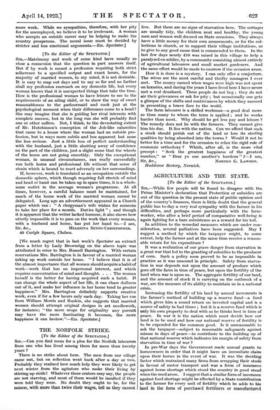THE NORFOLK STRIKE.
[To the Editor of the SPECTATOR.] Sni,—Can you find room for a plea for the Norfolk labourers from one who has lived among them for more than twenty years ?
There is no strike about here. The men from our village came out, but on reflection went back after a day or two. Probably they realized how much help they were likely to get next winter from the agitators who make their living by stirring up strife! Whatever these orators tnaysay, the people are not starving, and most of them would be insulted if they were told they were. No doubt they ought to be, for the
miners, with more than twice their wages, tell as they cannot
live. But there are no signs of starvation here. The cottages are usually tidy, the children neat and healthy, the young men and women well dressed on State occasions. They always have a little money for their own amusements, or for the col- lections in church, or to support their village institutions, or to give to any good cause that is commended to them. In the last few days nearly II0 was raised in this village to help a paralysed ex-soldier, by a community consisting almost entirely of agricultural labourers and small market gardeners. And -the same effort would be made to-morrow if the occasion arose.
How it is done is a mystery. I can only offer a conjecture. The wives are the most careful and thrifty 'managers I ever met. The money earned when wages were high was not spent on luxuries, and during the years I have lived-here I have never met a real drunkard. These people do not beg ; they do not air their grievances or ask for pity ; but occasionally one gets a glimpse of the shifts and contrivances by which they succeed in presenting a brave face to the world.
The farm labourer is a skilled workman—a good deal more so than many to whom the term is applied ; and he works harder than most. Why should he get less pay and leisure ? The remedy does not lie with the farmers. They cannot give him his due. It lies with the nation. Can we afford that such a stock should perish out of the land or lose its sterling qualities by being absorbed into the towns ? Would it not be better for a time and for the occasion to relax the rigid rule of economic orthodoxy ? Which, after all, is the more vital precept : " Seek the greatest happiness of the greatest number," or " Bear ye one another's burdens " .?—I am,










































 Previous page
Previous page